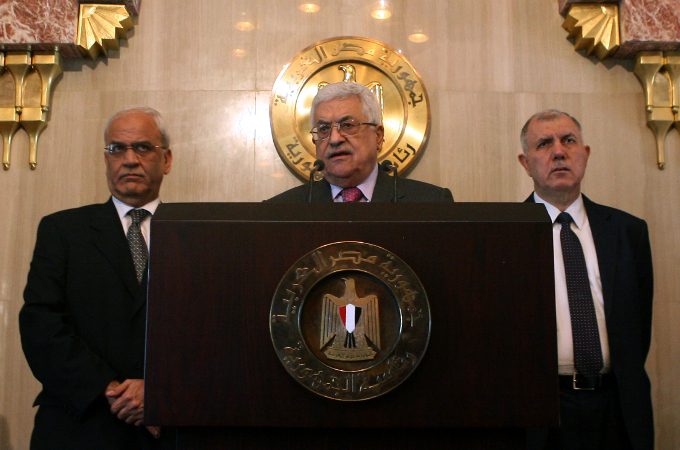PA lobbying blocked Shalit swap
The PA blocked potential prisoner swaps that would have freed thousands of Palestinians and Shalit.

For almost five years, family members of the thousands of Palestinians held in Israeli jails have waited in the hope that they might be reunited with their loved ones as Israel and Hamas engaged in mediated negotiations on a deal to exchange Gilad Shalit, the single Israeli prisoner of war held in the Gaza Strip, for the freedom of Palestinian prisoners.

But despite high expectations, the deal has never materialized. Analysis of secret minutes of meetings between top Israeli and Palestinian Authority (PA) officials revealed in The Palestine Papers shows that strenuous PA lobbying likely torpedoed the deal in mid-2008 with the result that far fewer Palestinian prisoners have been released by Israel.
The PA officials were concerned that an Israeli deal with Hamas would further weaken the PA and its US-supported leader Mahmoud Abbas, who also heads the Fatah political faction, Hamas’ main rival.
Keep reading
list of 4 itemsParallel economy: How Russia is defying the West’s boycott
The Kung Fu Nuns of Kathmandu
Myanmar Army on the Ropes
This revelation underscores the extent to which the PA was prepared to subordinate the immediate needs of Palestinians — including prisoners and their families — to the desperate battle with Hamas, of which they often spoke of with Israeli officials as a common enemy.
On 31 March 2008, at a meeting at the King David Hotel in Jerusalem, PA negotiator Ahmed Qureia, also known as Abu ‘Ala, protested to Israeli Foreign Minister Tzipi Livni that Israel was negotiating with Hamas over a prisoner swap. Livni explained, “We wanted to talk with Abu Mazen [Abbas] but he cannot release Gilead Shalit.”
Qureia responded, “The release of 450 prisoners, some of whom are very important, will make Hamas appear as a hero before the public and that Abu Mazen gives speeches only.” Livni again asserted, “The problem is that we are doing this because Abu Mazen is poor at marketing in the Gaza Strip. Otherwise we would have negotiated with him.”
PA officials pressed the message at a meeting with Israeli counterparts again headed by Livni at the Inbal Hotel in Jerusalem on 20 May 2008. In a formal presentation of the PA position on prisoners, Hisham Abd el Razek told the Israelis:
“You know that today or tomorrow Shalit’s issue will come up and you will have to release prisoners in exchange. This will give Hamas a push forward. Either both sides look at their mutual interest or either side looks at his [own] interests. We need to reach an agreement on what serves our mutual interests. In a week, two or a month you will release prisoners to Hamas in exchange of Shalit. What will this bring you? It will strengthen Hamas and not Abu Mazen. It will send the message that violence works. There are prisoners that have been sitting in prison for more than 20 years. They did most of their time and the Israeli public does not care much about them. Hamas will release them and not the peace process?”
Livni observed that she had “no doubt that Hamas will gain strength out of it [a release]. On the other hand we have a commitment towards him [Shalit]” and asked the Palestinians “whether there is a way, in your opinion, to strengthen the PA also and not Hamas in the issue of Shalit?”
Abd el Razek replied, “Yes I think that there is such an option. It lies in opening a direct channel for discussion on the living conditions of prisoners and releasing prisoners.” The PA wanted Israel to improve conditions for Palestinian prisoners and release prisoner to it, even though it had little to offer Israel.
Livni suggested that a release could be tied to the PA meeting some Israeli “benchmarks” and “doing something on the ground” in order to make it seem as if a release were in fact a response to positive actions by the PA. But Livni made it clear that Israel would not release prisoners just to support the PA leadership: “maybe there are benchmarks related to what’s happening on the ground that can be a condition for release. Strengthening Abu Mazen is not an excuse, to what is related on the ground.”
An exasperated Qureia told Livni, “I can’t understand that there are prisoners [still in prison] from before Oslo or that you release to Hamas and not to your partners. It’s an insult to the peace process where if, kidnapping Shalit and force [are rewarded but] you do not release prisoners for the peace process. This is the wrong message to send.”
As the weeks passed, PA officials became even more worried that Israel might go ahead with a deal to free Shalit. At a meeting in Berlin on 24 June 2008, Qureia told Livni, “Any release of prisoners for Hamas should be after a release for Abu Mazen.” PA chief negotiator Saeb Erekat pressed the point with a threat: “If you make it look like Hamas can protect their fighters, and get prisoners released, yet AM [Abbas], AA [Qureia] can’t get anything, we won’t be left with much of a choice but to withdraw from the negotiations!”
In her response, Livni noted that “even if we release [prisoners] for you, if Hamas gets what they want they will still get more than you!” Livni was implicitly pointing out that Hamas, unlike the PA, had something valuable that Israel wanted and would pay a price for: Shalit.
Livni is also quoted as saying:
“Our choice was between a massive operation, you would have stopped negotiations, or something else which undermines AM [Abbas]. It is lose – lose for the PA!”
From the context she appears to be saying that Israel’s choice was an attack on Gaza (presumably to attempt to free Shalit), or negotiating a prisoner exchange — neither of them options that would boost the PA.
But by this time, the PA lobbying appeared to be working. On 30 June 2008 at a meeting in the King David Hotel, Livni reported to Qureia and his colleagues about discussions within the Israeli government on a prisoner release: “I raised yesterday what you [AA] said in Berlin. When we need to release prisoners, we need to do it with the moderates otherwise it sends the message that only way to release prisoners is by kidnapping soldiers.”
Qureia asked, “Can AM [Abbas] expect 1000 released?” One thousand is the number of prisoners that had been widely reported as the price Israel was willing to pay for the release of Shalit. Livni answered “No.” She then discussed with the PA officials a way to make it seem as if the release were being done in exchange for something of value: “I am thinking … can we do something that relates to a change on the ground, so it can be our ‘excuse’ – let’s invent something.”
Erekat then proposed, “You used ‘benchmarks’ in Berlin. So let’s invent something – how about we are in this political process, as part of the process.” Livni responded, “How about a link to the situation in Jenin and Shechem [Nablus] – areas with greater Palestinian security control. Can we release to those areas?”
Finally at an 18 August 2008 meeting at the Crowne Plaza Hotel in Jerusalem, Livni informed the PA officials, “We are going ahead with the release of prisoners – 199, two from before Oslo. I want to note that these are really murderers; it’s not just a vague idea of ‘blood on their hands’. We will pay a price for it but I supported the decision, so long as it strengthens [you in the negotiations.]”
Livni also told the Palestinians, “I want you to explain clearly to your people that this is a positive move and not criticize that it is not enough, and to point out it is because of the negotiations” and she asked how the Palestinian “street” would receive the news.
Erekat answered, “It will be very good. There will be a big reception for them on the 25th at the muqataa,” Abbas’ headquarters in Ramallah. Qureia chimed in, “You know, Hamas is not happy.”
On 25 August 2008, The New York Times reported that Israel “released 198 Palestinian prisoners in a move intended to bolster the Palestinian president, Israel’s negotiating partner, hours before Secretary of State Condoleezza Rice arrived in the region to try to nudge forward Israeli-Palestinian peace efforts.”
Israeli government spokesman Mark Regev said the move was meant “to strengthen the moderate and pragmatic Palestinian leadership” and, according to The New York Times, “to show that engagement brings more results than extremism.”
While a small handful of the prisoners were lifers jailed before the 1993 Oslo Accords, about half had been scheduled to be released within the following year any way, the newspaper reported.
Speaking at the welcoming ceremony for the prisoners, Abbas said, “there will be no peace without the release of all the prisoners.” But it is clear from the records revealed in The Palestine Papers that while PA lobbying achieved a symbolic release of 198 prisoners it almost certainly meant that hundreds more who might have been freed in exchange for Shalit are still in the occupier’s jails.
Ali Abunimah is author of One Country, A Bold Proposal to End the Israeli-Palestinian Impasse and is a contributor to the newly-released book The Goldstone Report: The Legacy of the Landmark Investigation of the Gaza Conflict. He is a co-founder of the widely read online publication The Electronic Intifada, an award-winning online publication about Palestine and the Palestine conflict. He has written hundreds of articles on the question of Palestine for publications all over the world, including Al Jazeera.



